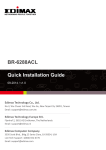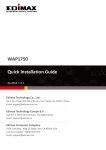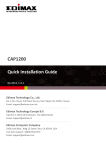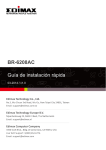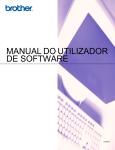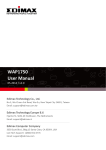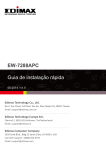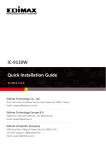Download 1. - Edimax
Transcript
OAP1750 Quick Installation Guide 10-2015 / v1.0 I. Informações sobre o produto I-1. Conteúdo da embalagem 3 2 1 4 5 6 1. 2. 3. Ponto de acesso Antenas (2,4G x 3 e 5G x 3) 1 suporte para montagem na 4. 5. 6. parede CD Guia de instalação rápida Conjunto de parafusos para montagem na parede/poste 2 I-2. Requisitos do sistema - Cabo Ethernet, comutador PoE ou Injector PoE - Computador com Web browser para configuração do ponto de acesso I-3. Descrição geral do hardware A Rede local (PoE) B 3 LED e reposição A. Porta de rede local com entrada para Power over Ethernet (PoE PD) B. 3 LED + interface M-smart de reposição I-4. Estado do LED Potência Rede local Sem fios Comportamento dos LED Verde O ponto de acesso está ligado. Desligado O ponto de acesso está desligado. Verde A porta LAN está ligada. Intermitente Actividade (transferência e recepção) Desligado A porta LAN está desligada. Verde Sem fios activado. Intermitente Actividade (transferência e recepção) Desligado Sem fios desactivado. 3 I-5. Repor Se tiver algum problema com o ponto de acesso, pode repor o dispositivo para as predefinições de origem. Isto irá repor todas as definições para os valores predefinidos. 1. Prima e mantenha premido o botão de reposição no ponto de acesso durante, pelo menos, 10 segundos. Em seguida, liberte o botão. Pode ser necessário um lápis ou um objecto pontiagudo semelhante para pressionar o botão de reposição. 2. Aguarde até o ponto de acesso se reiniciar. O ponto de acesso está pronto para configuração quando o LED se acende a verde. I-6. Montagem O ponto de acesso inclui um suporte para parede ou poste que requer alguma montagem. 1. Monte o suporte na parte de trás do ponto de acesso com os doze parafusos M6 e as quatro anilhas incluídos, como indicado abaixo. Certifique-se de que o ponto de acesso está montado com firmeza no suporte para montagem na parede. 4 1. Vertical 2. Horizontal Montagem na parede 2. Monte o suporte e o ponto de acesso numa parede com os parafusos de madeira e as buchas incluídos. Montagem num poste 3. Fixe o suporte e o ponto de acesso num poste com as correias de amarração incluídas. 5 Tipo 1 Tipo 2 Tipo 3 6 II. Configuração rápida O Ponto de acesso para exteriores em simultâneo de banda dupla 802.11ac inclui várias funções avançadas: - Tecnologia sem fios de banda dupla, alta velocidade em simultâneo 802.11ac - 32 SSID para efeitos de gestão - SNMP v1/v2c/v3 O ponto de acesso pode ficar operacional dentro de apenas alguns minutos. Pode funcionar como um ponto de acesso autónomo (modo PA) ou como parte de uma matriz PA (modo PA gerido). Para utilizar um PA gerido numa matriz PA, o ponto de acesso muda automaticamente de modo quando um Controlador PA é configurado de acordo com o método descrito em III. Edimax Pro NMS. II-1. Configuração inicial do modo PA 1. Ligue o ponto de acesso a um Comutador PoE ou a um Injector PoE através do cabo Ethernet, que pode fornecer energia e saída de dados. 2. Aguarde um momento até o ponto de acesso ser iniciado. O ponto de acesso está pronto quando o LED acende a verde. 7 3. Configure o endereço IP do computador para 192.168.2.x, em que x é um número no intervalo 3 – 100. Certifique-se de que não existem outras ligações à rede activas no seu computador (desligue as ligações Wi-Fi e os cabos Ethernet). 4. Introduza o endereço IP predefinido do ponto de acesso 192.168.2.2 na barra URL de um Web browser. 5. Irá receber uma mensagem para introduzir o nome de utilizador e a palavra-passe. Introduza o nome de utilizador predefinido “admin” e a palavra-passe predefinida “1234”. 6. Será apresentado o ecrã “Informações do sistema” indicado abaixo. 8 Os passos seguintes irão ajudá-lo a configurar as seguintes definições básicas do ponto de acesso: - Endereço IP da rede local SSID e segurança de 2,4 GHz e 5 GHz Nome de administrador e palavra-passe Hora e data É recomendável configurar estas definições antes de utilizar o ponto de acesso. 1. Para alterar o endereço IP da rede local do ponto de acesso, vá para “Definições de rede ” > “Endereço IP da rede local”. Será apresentado o ecrã abaixo. 2. Introduza as definições do endereço IP que pretende utilizar para o ponto de acesso. Pode utilizar um endereço IP dinâmico (DHCP) ou estático, dependendo do seu ambiente de rede. Clique em “Aplicar” para guardar as alterações e aguarde alguns instantes até o ponto de acesso ser carregado novamente. Quando alterar o endereço IP do ponto de acesso, terá de utilizar o novo endereço IP do ponto de acesso para aceder à interface de configuração baseada em browser, em vez do endereço IP predefinido 192.168.2.2. 3. Para alterar o SSID da(s) rede(s) sem fios de 2,4 GHz do ponto de acesso, vá para “Definições sem fios” > “11bgn de 2,4 GHz” > “Básicas”. Introduza o novo SSID da rede sem fios de 2,4 GHz no campo “SSID1” e clique em “Aplicar”. 9 Para utilizar vários SSID de 2,4 GHz, abra o menu pendente “Activar o número SSID” e seleccione o número de SSID que pretende. Em seguida, introduza um novo SSID nos campos numerados correspondentes abaixo e depois clique em “Aplicar”. 4. Para configurar a segurança da(s) rede(s) sem fios de 2,4 GHz do ponto de acesso, vá para “Definições sem fios” > “11bgn de 2,4 GHz” > “Segurança”. Seleccione um “Método de autenticação” e introduza uma “Chave pré-partilhada” ou uma “Chave de encriptação”, consoante a sua escolha e, em seguida, clique em “Aplicar”. Se utilizar vários SSID, especifique que SSID pretende configurar utilizando o menu pendente “SSID”. 10 5. Vá para “Definições sem fios” > “11ac 11an de 5 GHz” e repita os passos 3 e 4 da rede sem fios de 5 GHz do ponto de acesso. 6. Para alterar o nome de administrador e a palavra-passe da interface de configuração baseada em browser, vá para “Gestão” > “Admin”. 7. Preencha os campos “Nome de administrador” e “Palavra-passe do administrador” e clique em “Aplicar”. 8. Para especificar a hora correcta do ponto de acesso, vá para “Gestão” > “Definições de data e hora”. 9. Especifique a hora e o fuso horário correctos do ponto de acesso utilizando os menus pendentes. O ponto de acesso também inclui a opção NTP (Protocolo de hora de rede), portanto também pode introduzir o nome de anfitrião ou o endereço IP de um servidor de tempo. Clique em "Aplicar" quando terminar. Pode utilizar o botão “Adquirir hora actual do seu PC” se quiser definir o ponto de acesso para ficar igual à hora do seu PC. 10. As definições básicas do ponto de acesso estão agora configuradas. 11 III. Edimax Pro NMS A Edimax Pro Network Management Suite (NMS) suporta a gestão central de um grupo de pontos de acesso, também conhecido como uma matriz PA. NMS é compatível com um máximo de 16 pontos de acesso Edimax Pro, não é necessário um controlador sem fios adicional, ou 32 pontos de acesso com o controlador APC 500 AP, o que reduz os custos e facilita uma gestão PA remota eficaz. O Edimax Pro NMS é fácil de instalar. É apresentada abaixo uma descrição geral do sistema: Um PA (ponto de acesso) é designado como Controlador PA (principais) e os outros PA Edimax Pro ligados são designados automaticamente como PA geridos (secundários). Utilizar o Edimax Pro NMS permite-lhe monitorizar, configurar e gerir todos os PA geridos (até 32) a partir do único controlador PA. O OAP1750 funciona como um PA gerido, mas não funciona como um Controlador PA. 12 Quando utiliza um controlador PA Edimax NMS, outros PA ligados são definidos automaticamente para os PA geridos. Se o Controlador PA não conseguir encontrar o OAP1750 como PA gerido, pode configurar a definição manualmente, como indicado abaixo: 1. Certifique-se de que todos os PA, incluindo o OAP1750, estão ligados a um comutador Ethernet ou PoE, que por sua vez está ligado a um gateway/router. Pode utilizar o router como servidor DHCP ou pode configurar mais tarde o Controlador PA como servidor DHCP. 2. Certifique-se de que todos os PA estão ligados e verifique os LED. 13 3. Certifique-se de que configurou e designou um PA como Controlador PA, que irá gerir todos os outros PA ligados (até 32, dependendo do modelo). 4. Ligue um computador ao OAP1750 através do comutador PoE utilizando um cabo Ethernet. 14 5. Abra um Web browser e introduza o endereço IP do OAP1750 no campo de endereço. O endereço IP predefinido é 192.168.2.2 O endereço IP do computador deve estar na mesma subrede do OAP1750. Consulte o manual do utilizador para obter mais ajuda. Se alterou o endereço IP do Controlador PA ou se o seu gateway/router utiliza um servidor DHCP, certifique-se de que introduz o endereço IP correcto. Verifique as definições do gateway/router. 6. Introduza o nome de utilizador e a palavra-passe para iniciar sessão. O nome de utilizador e a palavra-passe predefinidos são admin e 1234. 7. Terá acesso ao Dashboard NMS Edimax Pro. Vá para “Modo de funcionamento” e seleccione “Modo PA gerido” no menu pendente. 15 8. Clique em “Aplicar” para guardar as definições para que o Controlador PA e as PA geridas ficam totalmente funcionais. Utilize o Edimax NMS no Controlador PA para gerir e monitorizar as suas PA geridas. Consulte o manual do utilizador do Controlador PA para obter ajuda sobre o Edimax NMS. 16 COPYRIGHT Copyright Edimax Technology Co., Ltd. all rights reserved. No part of this publication may be reproduced, transmitted, transcribed, stored in a retrieval system, or translated into any language or computer language, in any form or by any means, electronic, mechanical, magnetic, optical, chemical, manual or otherwise, without the prior written permission from Edimax Technology Co., Ltd. Edimax Technology Co., Ltd. makes no representations or warranties, either expressed or implied, with respect to the contents hereof and specifically disclaims any warranties, merchantability, or fitness for any particular purpose. Any software described in this manual is sold or licensed as is. Should the programs prove defective following their purchase, the buyer (and not this company, its distributor, or its dealer) assumes the entire cost of all necessary servicing, repair, and any incidental or consequential damages resulting from any defect in the software. Edimax Technology Co., Ltd. reserves the right to revise this publication and to make changes from time to time in the contents hereof without the obligation to notify any person of such revision or changes. The product you have purchased and the setup screen may appear slightly different from those shown in this QIG. The software and specifications are subject to change without notice. Please visit our website www.edimax.com for updates. All brand and product names mentioned in this manual are trademarks and/or registered trademarks of their respective holders. 17 Federal Communication Commission Interference Statement This equipment has been tested and found to comply with the limits for a Class B digital device, pursuant to Part 15 of FCC Rules. These limits are designed to provide reasonable protection against harmful interference in a residential installation. This equipment generates, uses, and can radiate radio frequency energy and, if not installed and used in accordance with the instructions, may cause harmful interference to radio communications. However, there is no guarantee that interference will not occur in a particular installation. If this equipment does cause harmful interference to radio or television reception, which can be determined by turning the equipment off and on, the user is encouraged to try to correct the interference by one or more of the following measures: 1. Reorient or relocate the receiving antenna. 2. Increase the separation between the equipment and receiver. 3. Connect the equipment into an outlet on a circuit different from that to which the receiver is connected. 4. Consult the dealer or an experienced radio technician for help. FCC Caution This device and its antenna must not be co-located or operating in conjunction with any other antenna or transmitter. This device complies with Part 15 of the FCC Rules. Operation is subject to the following two conditions: (1) this device may not cause harmful interference, and (2) this device must accept any interference received, including interference that may cause undesired operation. Any changes or modifications not expressly approved by the party responsible for compliance could void the authority to operate equipment. Federal Communications Commission (FCC) Radiation Exposure Statement This equipment complies with FCC radiation exposure set forth for an uncontrolled environment. In order to avoid the possibility of exceeding the FCC radio frequency exposure limits, human proximity to the antenna shall not be less than 2.5cm (1 inch) during normal operation. Federal Communications Commission (FCC) RF Exposure Requirements SAR compliance has been established in the laptop computer(s) configurations with PCMCIA slot on the side near the center, as tested in the application for certification, and can be used in laptop computer(s) with substantially similar physical dimensions, construction, and electrical and RF characteristics. Use in other devices such as PDAs or lap pads is not authorized. This transmitter is restricted for use with the specific antenna tested in the application for certification. The antenna(s) used for this transmitter must not be co-located or operating in conjunction with any other antenna or transmitter. R&TTE Compliance Statement This equipment complies with all the requirements of DIRECTIVE 1999/5/EC OF THE EUROPEAN PARLIAMENT AND THE COUNCIL of March 9, 1999 on radio equipment and telecommunication terminal equipment and the mutual recognition of their conformity (R&TTE). The R&TTE Directive repeals and replaces in the directive 98/13/EEC (Telecommunications Terminal Equipment and Satellite Earth Station Equipment) As of April 8, 2000. Safety This equipment is designed with the utmost care for the safety of those who install and use it. However, special attention must be paid to the dangers of electric shock and static electricity when working with electrical equipment. All guidelines of this and of the computer manufacture must therefore be allowed at all times to ensure the safe use of the equipment. EU Countries Intended for Use The ETSI version of this device is intended for home and office use in Austria, Belgium, Bulgaria, Cyprus, Czech, Denmark, Estonia, Finland, France, Germany, Greece, Hungary, Ireland, Italy, Latvia, Lithuania, Luxembourg, Malta, Netherlands, Poland, Portugal, Romania, Slovakia, Slovenia, Spain, Sweden, Turkey, and United Kingdom. The ETSI version of this device is also authorized for use in EFTA member states: Iceland, Liechtenstein, Norway, and Switzerland. EU Countries Not Intended for Use None 18 EU Declaration of Conformity English: This equipment is in compliance with the essential requirements and other relevant provisions of Directive 1995/5/EC, 2009/125/EC, 2006/95/EC, 2011/65/EC. Français: Cet équipement est conforme aux exigences essentielles et autres dispositions de la directive 1995/5/CE, 2009/125/CE, 2006/95/CE, 2011/65/CE. Čeština: Toto zařízení je v souladu se základními požadavky a ostatními příslušnými ustanoveními směrnic 1995/5/ES, 2009/125/ES, 2006/95/ES, 2011/65/ES. Polski: Urządzenie jest zgodne z ogólnymi wymaganiami oraz szczególnymi warunkami określonymi Dyrektywą UE 1995/5/EC, 2009/125/EC, 2006/95/EC, 2011/65/EC.. Română: Acest echipament este în conformitate cu cerinţele esenţiale şi alte prevederi relevante ale Directivei 1995/5/CE, 2009/125/CE, 2006/95/CE, 2011/65/CE. Русский: Это оборудование соответствует основным требованиям и положениям Директивы 1995/5/EC, 2009/125/EC, 2006/95/EC, 2011/65/EC. Magyar: Ez a berendezés megfelel az alapvető követelményeknek és más vonatkozó irányelveknek (1995/5/EK, 2009/125/EK, 2006/95/EK, 2011/65/EK). Türkçe: Bu cihaz 1995/5/EC, 2009/125/EC, 2006/95/EC, 2011/65/EC direktifleri zorunlu istekler ve diğer hükümlerle ile uyumludur. Українська: Обладнання відповідає вимогам і умовам директиви 1995/5/EC, 2009/125/EC, 2006/95/EC, 2011/65/EC. Slovenčina: Toto zariadenie spĺňa základné požiadavky a ďalšie príslušné ustanovenia smerníc 1995/5/ES, 2009/125/ES, 2006/95/ES, 2011/65/ES. Deutsch: Dieses Gerät erfüllt die Voraussetzungen gemäß den Richtlinien 1995/5/EC, 2009/125/EC, 2006/95/EC, 2011/65/EC. Español: El presente equipo cumple los requisitos esenciales de la Directiva 1995/5/EC, 2009/125/EC, 2006/95/EC, 2011/65/EC. Italiano: Questo apparecchio è conforme ai requisiti essenziali e alle altre disposizioni applicabili della Direttiva 1995/5/CE, 2009/125/CE, 2006/95/CE, 2011/65/CE. Nederlands: Dit apparaat voldoet aan de essentiële eisen en andere van toepassing zijnde bepalingen van richtlijn 1995/5/EC, 2009/125/EC, 2006/95/EC, 2011/65/EC.. Português: Este equipamento cumpre os requesitos essênciais da Directiva 1995/5/EC, 2009/125/EC, 2006/95/EC, 2011/65/EC. Norsk: Dette utstyret er i samsvar med de viktigste kravene og andre relevante regler i Direktiv 1995/5/EC, 2009/125/EC, 2006/95/EC, 2011/65/EC. Svenska: Denna utrustning är i överensstämmelse med de väsentliga kraven och övriga relevanta bestämmelser i direktiv 1995/5/EG, 2009/125/EG, 2006/95/EG, 2011/65/EG. Dansk: Dette udstyr er i overensstemmelse med de væ sentligste krav og andre relevante forordninger i direktiv 1995/5/EC, 2009/125/EC, 2006/95/EC, 2011/65/EC. suomen kieli: Tämä laite täyttää direktiivien 1995/5/EY, 2009/125/EY, 2006/95/EY, 2011/65/EY oleelliset vaatimukset ja muut asiaankuuluvat määräykset. ----------------------------------------------------------------------------------------------------------------------WEEE Directive & Product Disposal At the end of its serviceable life, this product should not be treated as household or general waste. It should be handed over to the applicable collection point for the recycling of electrical and electronic equipment, or returned to the supplier for disposal. 19 Declaration of Conformity We, Edimax Technology Co., Ltd., declare under our sole responsibility, that the equipment described below complies with the requirements of the European R&TTE directives. Equipment: AC1750 Outdoor Access Point Model No.: OAP1750 The following European standards for essential requirements have been followed: Directives 1999/5/EC Spectrum EMC : : ETSI EN 300 328 V1.9.1 (2015-02); EN 301 489-1 V1.9.2 (2011-09); EN301 489-17 V2.2.1(2012-09); EN 301 893 V1.8.1(2015-03); Safety (LVD) : IEC 60950-1:2005 (2nd Edition)+Am 1:2009+Am 2:2013 EN 60950-1:2006+A11:2009+A1:2010+A12:2011+A2:2013 Recommendation19 99/5/EC EMF : EN 62311:2008 Directives 2006/95/EC Safety (LVD) : IEC 60950-1:2005 (2nd Edition)+Am 1:2009+Am 2:2013 EN 60950-1:2006+A11:2009+A1:2010+A12:2011+A2:2013 Edimax Technology Co., Ltd. No. 3, Wu Chuan 3rd Road, Wu-Ku Industrial Park, New Taipei City, Taiwan Date of Signature: Jan, 2015 Signature: Printed Name: Title: 20 Albert Chang Director Edimax Technology Co., Ltd. Notice According to GNU General Public License Version 2 This product includes software that is subject to the GNU General Public License version 2. The program is free software and distributed without any warranty of the author. We offer, valid for at least three years, to give you, for a charge no more than the costs of physically performing source distribution, a complete machine-readable copy of the corresponding source code. Das Produkt beinhaltet Software, die den Bedingungen der GNU/GPL-Version 2 unterliegt. Das Programm ist eine sog. „Free Software“, der Autor stellt das Programm ohne irgendeine Gewährleistungen zur Verfügung. Wir bieten Ihnen für einen Zeitraum von drei Jahren an, eine vollständige maschinenlesbare Kopie des Quelltextes der Programme zur Verfügung zu stellen – zu nicht höheren Kosten als denen, die durch den physikalischen Kopiervorgang anfallen. GNU GENERAL PUBLIC LICENSE Version 2, June 1991 Copyright (C) 1989, 1991 Free Software Foundation, Inc. 51 Franklin Street, Fifth Floor, Boston, MA 02110-1301, USA Everyone is permitted to copy and distribute verbatim copies of this license document, but changing it is not allowed. Preamble The licenses for most software are designed to take away your freedom to share and change it. By contrast, the GNU General Public License is intended to guarantee your freedom to share and change free software--to make sure the software is free for all its users. This General Public License applies to most of the Free Software Foundation’s software and to any other program whose authors commit to using it. (Some other Free Software Foundation software is covered by the GNU Lesser General Public License instead.) You can apply it to your programs, too. When we speak of free software, we are referring to freedom, not price. Our General Public Licenses are designed to make sure that you have the freedom to distribute copies of free software (and charge for this service if you wish), that you receive source code or can get it if you want it, that you can change the software or use pieces of it in new free programs; and that you know you can do these things. To protect your rights, we need to make restrictions that forbid anyone to deny you these rights or to ask you to surrender the rights. These restrictions translate to certain responsibilities for you if you distribute copies of the software, or if you modify it. For example, if you distribute copies of such a program, whether gratis or for a fee, you must give the recipients all the rights that you have. You must make sure that they, too, receive or can get the source code. And you must show them these terms so they know their rights. We protect your rights with two steps: (1) copyright the software, and (2) offer you this license which gives you legal permission to copy, distribute and/or modify the software. Also, for each author’s protection and ours, we want to make certain that everyone understands that there is no warranty for this free software. If the software is modified by someone else and passed on, we want its recipients to know that what they have is not the original, so that any problems introduced by others will not reflect on the original authors’ reputations. Finally, any free program is threatened constantly by software patents. We wish to avoid the danger that redistributors of a free program will individually obtain patent licenses, in effect making the program proprietary. To prevent this, we have made it clear that any patent must be licensed for everyone’s free use or not licensed at all. The precise terms and conditions for copying, distribution and modification follow. TERMS AND CONDITIONS FOR COPYING, DISTRIBUTION AND MODIFICATION 0. This License applies to any program or other work which contains a notice placed by the copyright holder saying it may be distributed under the terms of this General Public License. The ‘“Program’“, below, refers to any such program or work, and a ‘“work based on the Program’“ means either the Program or any derivative work under copyright law: that is to say, a work containing the Program or a portion of it, either verbatim or with modifications and/or translated into another language. (Hereinafter, translation is included without limitation in the term ‘“modification’“.) Each licensee is addressed as ‘“you’“. Activities other than copying, distribution and modification are not covered by this License; they are outside its scope. The act of running the Program is not restricted, and the output from the Program is covered only if its contents constitute a work based on the Program (independent of having been made by running the Program). Whether that is true depends on what the Program does. 21 1. You may copy and distribute verbatim copies of the Program’s source code as you receive it, in any medium, provided that you conspicuously and appropriately publish on each copy an appropriate copyright notice and disclaimer of warranty; keep intact all the notices that refer to this License and to the absence of any warranty; and give any other recipients of the Program a copy of this License along with the Program. You may charge a fee for the physical act of transferring a copy, and you may at your option offer warranty protection in exchange for a fee. 2. You may modify your copy or copies of the Program or any portion of it, thus forming a work based on the Program, and copy and distribute such modifications or work under the terms of Section 1 above, provided that you also meet all of these conditions: a) You must cause the modified files to carry prominent notices stating that you changed the files and the date of any change. b) You must cause any work that you distribute or publish, that in whole or in part contains or is derived from the Program or any part thereof, to be licensed as a whole at no charge to all third parties under the terms of this License. c) If the modified program normally reads commands interactively when run, you must cause it, when started running for such interactive use in the most ordinary way, to print or display an announcement including an appropriate copyright notice and a notice that there is no warranty (or else, saying that you provide a warranty) and that users may redistribute the program under these conditions, and telling the user how to view a copy of this License. (Exception: if the Program itself is interactive but does not normally print such an announcement, your work based on the Program is not required to print an announcement.) These requirements apply to the modified work as a whole. If identifiable sections of that work are not derived from the Program, and can be reasonably considered independent and separate works in themselves, then this License, and its terms, do not apply to those sections when you distribute them as separate works. But when you distribute the same sections as part of a whole which is a work based on the Program, the distribution of the whole must be on the terms of this License, whose permissions for other licensees extend to the entire whole, and thus to each and every part regardless of who wrote it. Thus, it is not the intent of this section to claim rights or contest your rights to work written entirely by you; rather, the intent is to exercise the right to control the distribution of derivative or collective works based on the Program. In addition, mere aggregation of another work not based on the Program with the Program (or with a work based on the Program) on a volume of a storage or distribution medium does not bring the other work under the scope of this License. 3. You may copy and distribute the Program (or a work based on it, under Section 2) in object code or executable form under the terms of Sections 1 and 2 above provided that you also do one of the following: a) Accompany it with the complete corresponding machine-readable source code, which must be distributed under the terms of Sections 1 and 2 above on a medium customarily used for software interchange; or, b) Accompany it with a written offer, valid for at least three years, to give any third party, for a charge no more than your cost of physically performing source distribution, a complete machine-readable copy of the corresponding source code, to be distributed under the terms of Sections 1 and 2 above on a medium customarily used for software interchange; or, c) Accompany it with the information you received as to the offer to distribute corresponding source code. (This alternative is allowed only for noncommercial distribution and only if you received the program in object code or executable form with such an offer, in accord with Subsection b above.) The source code for a work means the preferred form of the work for making modifications to it. For an executable work, complete source code means all the source code for all modules it contains, plus any associated interface definition files, plus the scripts used to control compilation and installation of the executable. However, as a special exception, the source code distributed need not include anything that is normally distributed (in either source or binary form) with the major components (compiler, kernel, and so on) of the operating system on which the executable runs, unless that component itself accompanies the executable. If distribution of executable or object code is made by offering access to copy from a designated place, then offering equivalent access to copy the source code from the same place counts as distribution of the source code, even though third parties are not compelled to copy the source along with the object code. 4. You may not copy, modify, sublicense, or distribute the Program except as expressly provided under this License. Any attempt otherwise to copy, modify, sublicense or distribute the Program is void, and will automatically terminate your rights under this License. However, parties who have received copies, or rights, from you under this License will not have their licenses terminated so long as such parties remain in full compliance. 22 5. You are not required to accept this License, since you have not signed it. However, nothing else grants you permission to modify or distribute the Program or its derivative works. These actions are prohibited by law if you do not accept this License. Therefore, by modifying or distributing the Program (or any work based on the Program), you indicate your acceptance of this License to do so, and all its terms and conditions for copying, distributing or modifying the Program or works based on it. 6. Each time you redistribute the Program (or any work based on the Program), the recipient automatically receives a license from the original licensor to copy, distribute or modify the Program subject to these terms and conditions. You may not impose any further restrictions on the recipients’ exercise of the rights granted herein. You are not responsible for enforcing compliance by third parties to this License. 7. If, as a consequence of a court judgment or allegation of patent infringement or for any other reason (not limited to patent issues), conditions are imposed on you (whether by court order, agreement or otherwise) that contradict the conditions of this License, they do not excuse you from the conditions of this License. If you cannot distribute so as to satisfy simultaneously your obligations under this License and any other pertinent obligations, then as a consequence you may not distribute the Program at all. For example, if a patent license would not permit royalty-free redistribution of the Program by all those who receive copies directly or indirectly through you, then the only way you could satisfy both it and this License would be to refrain entirely from distribution of the Program. If any portion of this section is held invalid or unenforceable under any particular circumstance, the balance of the section is intended to apply and the section as a whole is intended to apply in other circumstances. It is not the purpose of this section to induce you to infringe any patents or other property right claims or to contest validity of any such claims; this section has the sole purpose of protecting the integrity of the free software distribution system, which is implemented by public license practices. Many people have made generous contributions to the wide range of software distributed through that system in reliance on consistent application of that system; it is up to the author/donor to decide if he or she is willing to distribute software through any other system and a licensee cannot impose that choice. This section is intended to make thoroughly clear what is believed to be a consequence of the rest of this License. 8. If the distribution and/or use of the Program is restricted in certain countries either by patents or by copyrighted interfaces, the original copyright holder who places the Program under this License may add an explicit geographical distribution limitation excluding those countries, so that distribution is permitted only in or among countries not thus excluded. In such case, this License incorporates the limitation as if written in the body of this License. 9. The Free Software Foundation may publish revised and/or new versions of the General Public License from time to time. Such new versions will be similar in spirit to the present version, but may differ in detail to address new problems or concerns. Each version is given a distinguishing version number. If the Program specifies a version number of this License which applies to it and ‘“any later version’“, you have the option of following the terms and conditions either of that version or of any later version published by the Free Software Foundation. If the Program does not specify a version number of this License, you may choose any version ever published by the Free Software Foundation. 10. If you wish to incorporate parts of the Program into other free programs whose distribution conditions are different, write to the author to ask for permission. For software which is copyrighted by the Free Software Foundation, write to the Free Software Foundation; we sometimes make exceptions for this. Our decision will be guided by the two goals of preserving the free status of all derivatives of our free software and of promoting the sharing and reuse of software generally. NO WARRANTY 11. BECAUSE THE PROGRAM IS LICENSED FREE OF CHARGE, THERE IS NO WARRANTY FOR THE PROGRAM, TO THE EXTENT PERMITTED BY APPLICABLE LAW. EXCEPT WHEN OTHERWISE STATED IN WRITING THE COPYRIGHT HOLDERS AND/OR OTHER PARTIES PROVIDE THE PROGRAM ‘“AS IS’“ WITHOUT WARRANTY OF ANY KIND, EITHER EXPRESSED OR IMPLIED, INCLUDING, BUT NOT LIMITED TO, THE IMPLIED WARRANTIES OF MERCHANTABILITY AND FITNESS FOR A PARTICULAR PURPOSE. THE ENTIRE RISK AS TO THE QUALITY AND PERFORMANCE OF THE PROGRAM IS WITH YOU. SHOULD THE PROGRAM PROVE DEFECTIVE, YOU ASSUME THE COST OF ALL NECESSARY SERVICING, REPAIR OR CORRECTION. 12. IN NO EVENT UNLESS REQUIRED BY APPLICABLE LAW OR AGREED TO IN WRITING WILL ANY COPYRIGHT HOLDER, OR ANY OTHER PARTY WHO MAY MODIFY AND/OR REDISTRIBUTE THE PROGRAM AS PERMITTED ABOVE, BE LIABLE TO YOU FOR DAMAGES, INCLUDING ANY GENERAL, SPECIAL, INCIDENTAL OR CONSEQUENTIAL DAMAGES ARISING OUT OF THE USE OR INABILITY TO USE THE PROGRAM (INCLUDING BUT NOT LIMITED TO LOSS OF DATA OR DATA BEING RENDERED INACCURATE OR LOSSES SUSTAINED BY YOU OR THIRD PARTIES OR A FAILURE OF THE PROGRAM TO OPERATE WITH ANY OTHER PROGRAMS), EVEN IF SUCH HOLDER OR OTHER PARTY HAS BEEN ADVISED OF THE POSSIBILITY OF SUCH DAMAGES 23 24
























